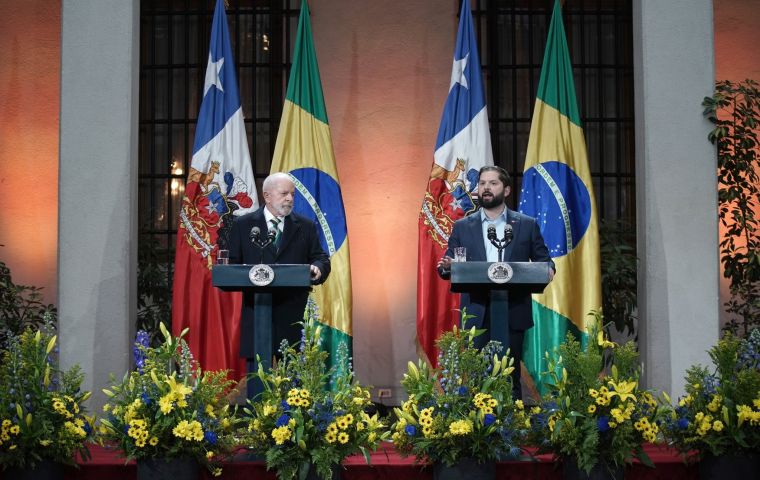MercoPress. South Atlantic News Agency
Lula and Boric agree to have Bioceanic Corridor operational by 2025
 The two leaders also signed 19 bilateral agreements
The two leaders also signed 19 bilateral agreements Presidents Gabriel Boric Font and Luiz Inácio Lula da Silva Monday agreed on the importance of speeding up the construction of the bioceanic corridor. They made those remarks while appearing at the Chile-Brazil Business Forum in Santiago. Later in the day, they also signed 19 bilateral understandings.
The Bioceanic Road Corridor will link the Atlantic and Pacific oceans. Following Monday's meeting, both leaders pledged to have it operational by the first half of 2025. The project was first devised in 2015 as a land route of new and existing highways linking Brazil's center west, the Paraguayan Chaco, and the Argentine provinces of Salta and Jujuy with northern Chile and the ports in Antofagasta, Mejillones, and Iquique. The geographic area along this corridor has a population of over 30 million and abundant mineral and agricultural resources.
“The development of common infrastructure is the basis for a more prosperous, united, and interconnected continent,” Lula said. “Chile can be the gateway for Brazilian products to the Pacific and Brazil can play the same role for access of Chilean exports to the African continent,” he added. This route will save “1,000 dollars for each container exported to Asia,” he also explained.
Boric replied that this reduction in costs would “mean greater wealth.” He also noted that “greater wealth in progressive governments also means greater income redistribution.”
“The only way to become stronger in the face of international turbulence is to work in a more coordinated manner and that, even though we Latin Americans are very good at adjectives and rhetoric, has to be translated into tangible projects. That is why the Bioceanic Corridor is tremendously important,” he also pointed out.
In addition, Boric posted on X: “We move forward in #MásInversión!President @GabrielBoric together with President @LulaOficial, participated in the closing of the Chile-Brazil Business Forum, an instance in which the relationship in economic, technological, energy, tourism, and agricultural matters of both countries was deepened.”
Later Monday, Lula and Boric met at the La Moneda Palace to sign 19 agreements in areas ranging from tourism, science and technology, defense, agriculture, and human rights to trade and investment relations, Agencia Brasil reported.
The two countries have more than 90 bilateral agreements in force and a balanced trade, but still little diversified. The agreements signed Monday were aimed at this diversification, it was explained.
In his speech, Lula highlighted the partnerships agreed upon for real integration between the countries, especially in the areas of climate change and tourism: “South American integration is a reality that makes a difference in people's lives, as demonstrated by the roaming charge exemption agreement we signed last year and the reciprocal recognition agreement for authorization cards we signed today,” said Lula.
“In addition, the challenges posed by natural disasters and organized crime cross countries. The fires of 2023 in Chile and this year's fires in southern Brazil challenge climate denialism and reinforce the need for cooperation. The Chilean proposal to establish a regional disaster response mechanism has our support and our backing,” the Brazilian President also stressed.
Boric also underscored the importance of agreements that should increase the commercial and tourist flow between the two countries and joint actions to combat organized crime and drug trafficking. A treaty on extradition was signed as well.
Brazil is Chile's third largest trading partner, with a trade exchange amounting to US$ 12.3 billion per year. Chile sells copper, fish, and minerals.
The sixth largest destination of Brazilian exports; Chile buys mainly oil, beef, and automobiles.
It is expected that the conclusion of the negotiations on the rules of origin of the Free Trade Agreement would allow the increase of vehicle exports, which are relevant for the Brazilian side.
Brazil is the largest Latin American investor in Chile, with more than US$ 4.5 billion, in sectors such as energy, financial services, food, mining, construction, and pharmaceuticals. It is also the main destination of Chilean investments abroad, with almost 30% of the total stock. Chilean companies are active in Brazil in areas such as cellulose.
Chilean travelers are the third largest group of tourists visiting Brazil each year while Brazilians accounted for Chile's second largest group of tourists in 2023. Among the agreements signed Monday was an action plan for the implementation of the tourism agreement between the two countries to facilitate and stimulate further travel.
Lula also praised Chile's cooperation with the G20 working groups while Boric announced that his country would join the Global Alliance against Hunger and Poverty. Both leaders have coinciding positions on several issues of the global agenda such as the defense of democracy, regional integration, environment, human rights, social inclusion, labor rights, and the situation of Palestine.
The Brazilian president also invited Boric to participate in the meeting of leaders against extremism, to take place on the sidelines of the United Nations General Assembly (UN), in September, in New York, an initiative undertaken by Lula and Spanish Prime Minister Pedro Sánchez.
Lula is on his first official trip to Chile since returning to office in Jan. 2023. He is to round up his visit to Chile Tuesday with meetings with Santiago Mayor Irací Hassler and former Socialist President Ricardo Lagos (2000-2006), as well as a tour of the construction site of the National Space Center on the outskirts of the capital.




Top Comments
Disclaimer & comment rulesCommenting for this story is now closed.
If you have a Facebook account, become a fan and comment on our Facebook Page!